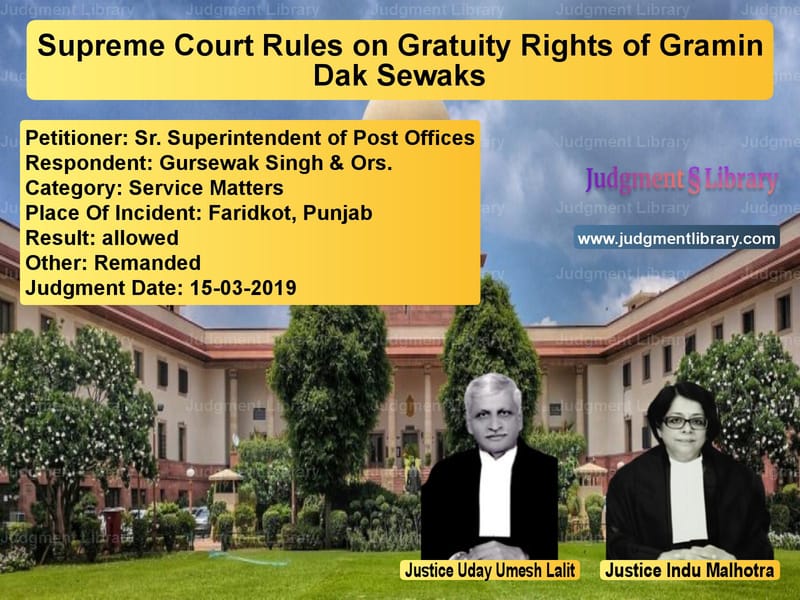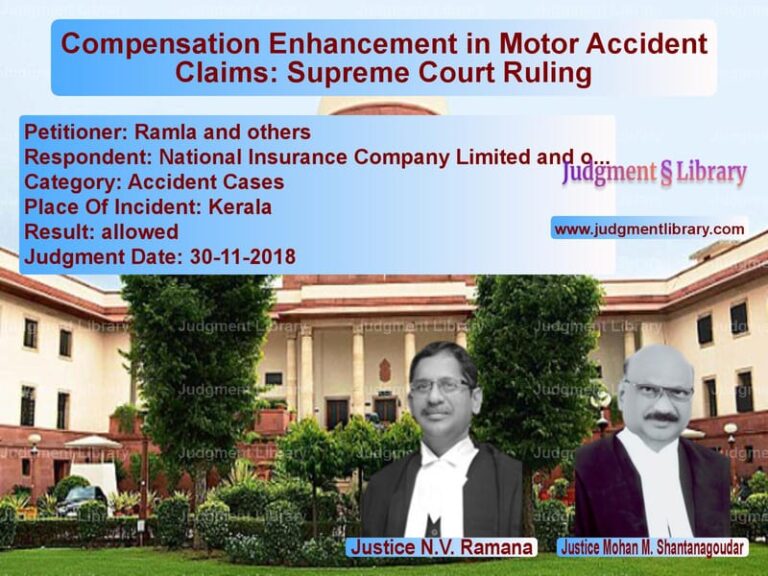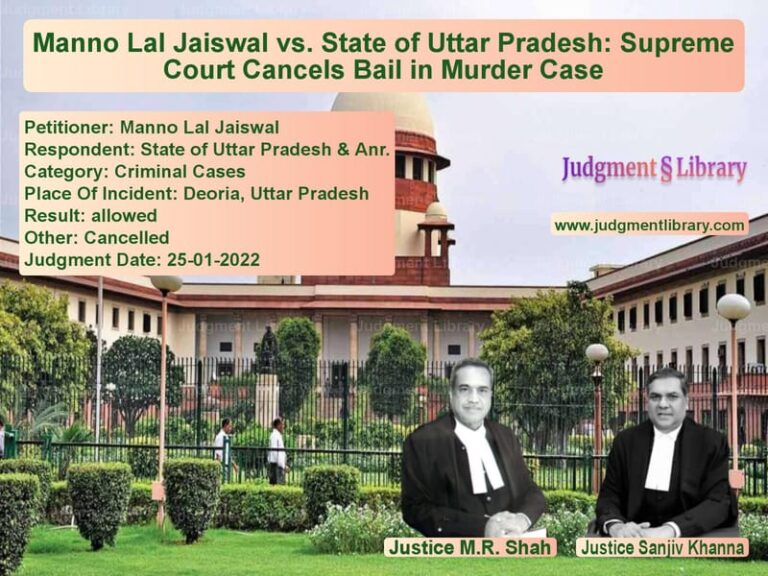Supreme Court Rules on Gratuity Rights of Gramin Dak Sewaks
The Supreme Court of India, in the case of Sr. Superintendent of Post Offices vs. Gursewak Singh & Ors., clarified whether Gramin Dak Sewaks (GDS) are entitled to gratuity benefits under the Payment of Gratuity Act, 1972. The case revolved around the employment status of GDS and whether they qualify as ‘employees’ under the Act, particularly when they resign from service.
Background of the Case
The case involved two appeals filed by the Sr. Superintendent of Post Offices against the Punjab & Haryana High Court’s decision granting gratuity benefits to GDS employees.
The first case, Gursewak Singh’s case, involved an individual who was engaged as a Gramin Dak Sewak (GDS) in the Postal Department on June 26, 1991, in Faridkot, Punjab. In 2014, he voluntarily resigned from the job, and his resignation was accepted by the department on August 28, 2014. He then approached the Controlling Authority-cum-Assistant Labour Commissioner, Jalandhar, seeking gratuity under the Payment of Gratuity Act, 1972.
The Department rejected his claim, stating that:
- As per the Gramin Dak Sewak (Conduct & Engagement) Rules, 2011, GDS employees are not entitled to gratuity upon voluntary resignation.
- GDS employees are not regular government employees and are only engaged on a part-time basis.
However, the Controlling Authority ruled in favor of Gursewak Singh and ordered the Department to pay Rs. 1,06,021 with interest at 10% per annum from August 28, 2014.
Appeal Before the High Court
The Department filed a writ petition in the Punjab & Haryana High Court, challenging the Controlling Authority’s decision. The High Court dismissed the petition and relied on previous judgments where similar claims had been allowed.
Key Issues Before the Supreme Court
The Supreme Court had to decide:
- Whether a Gramin Dak Sewak is an ‘employee’ as per Section 2(e) of the Payment of Gratuity Act, 1972.
- Whether a GDS is eligible for gratuity under the 2011 Rules upon voluntary resignation.
Arguments by the Department
The Department argued that:
- Gramin Dak Sewaks are not government employees but part-time extra-departmental agents.
- They are governed by the Gramin Dak Sewak (Conduct & Engagement) Rules, 2011, which explicitly state that gratuity is not payable upon resignation.
- The Payment of Gratuity Act, 1972 applies to employees in regular establishments, whereas GDS work part-time and are outside the Civil Service of the Union.
Arguments by the Respondents
The respondents contended that:
- The Payment of Gratuity Act, 1972 applies to every ‘establishment’ employing 10 or more people.
- The Postal Department is an ‘establishment’ as per the Indian Post Office Act, 1898.
- Under Section 4(1)(b) of the Gratuity Act, employees are entitled to gratuity even upon resignation.
- The 2011 Rules contradict the Payment of Gratuity Act, which should override departmental rules.
Supreme Court’s Observations
The Supreme Court analyzed the legal framework governing gratuity payments and the employment status of Gramin Dak Sewaks. The Court noted:
- The Payment of Gratuity Act applies to employees of factories, mines, oilfields, plantations, and establishments.
- Section 2(e) of the Act excludes persons who are governed by any other law or rules providing for gratuity.
- GDS employees are expressly excluded from the definition of ‘employee’ under the Act because they are governed by the 2011 Rules.
- The 2011 Rules form a self-contained code that specifically states that GDS employees are not entitled to gratuity upon resignation.
The Supreme Court held:
“Gramin Dak Sewaks are not regular government employees, and their engagement is on a part-time basis with a different set of rules. They cannot claim benefits under the Payment of Gratuity Act, 1972.”
Final Judgment
The Supreme Court allowed the appeal and ruled:
- Gramin Dak Sewaks are not entitled to gratuity under the Payment of Gratuity Act, 1972.
- The Gramin Dak Sewak (Conduct & Engagement) Rules, 2011 govern their gratuity rights.
- Since the respondent voluntarily resigned, he was not entitled to any gratuity benefits.
The Court concluded:
“The 2011 Rules govern the service conditions of Gramin Dak Sewaks. Since these rules do not allow gratuity upon resignation, the High Court’s decision was erroneous and is hereby set aside.”
Conclusion
This ruling establishes that Gramin Dak Sewaks are not covered under the Payment of Gratuity Act, 1972 and must rely on the provisions of the 2011 Rules. The decision reinforces the principle that departmental rules take precedence over general laws when expressly stated.
Petitioner Name: Sr. Superintendent of Post Offices.Respondent Name: Gursewak Singh & Ors..Judgment By: Justice Uday Umesh Lalit, Justice Indu Malhotra.Place Of Incident: Faridkot, Punjab.Judgment Date: 15-03-2019.
Don’t miss out on the full details! Download the complete judgment in PDF format below and gain valuable insights instantly!
Download Judgment: Sr. Superintendent o vs Gursewak Singh & Ors Supreme Court of India Judgment Dated 15-03-2019.pdf
Direct Downlaod Judgment: Direct downlaod this Judgment
See all petitions in Pension and Gratuity
See all petitions in Public Sector Employees
See all petitions in Judgment by Uday Umesh Lalit
See all petitions in Judgment by Indu Malhotra
See all petitions in allowed
See all petitions in Remanded
See all petitions in supreme court of India judgments March 2019
See all petitions in 2019 judgments
See all posts in Service Matters Category
See all allowed petitions in Service Matters Category
See all Dismissed petitions in Service Matters Category
See all partially allowed petitions in Service Matters Category







